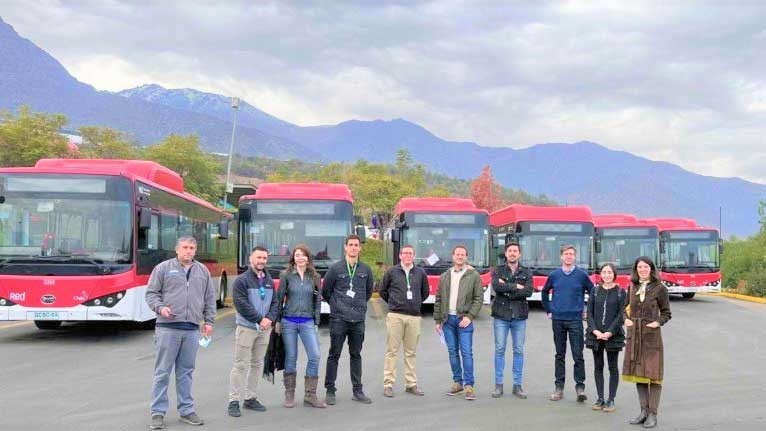The Columbia Alumni Association of Chile - which was formalized at the end of 2021, making it a legally recognized entity in the country – held its latest activity in April, with members enjoying a private tour of the first electric bus depot in Latin America.
Alumni met at the electric depot located in the borough of Peñalolén, in capital Santiago, which was financed and built by Italian electric company Enel and is operated by the bus company MetBus, one of the concessionaires of Santiago’s public transit system Red Metropolitana de Movilidad.
The project is highly innovative as it involves an electric company and a bus operator – something that is not commonly seen, according to Gabriel Guggisberg (SIPA'18), who led the tour. Enel financed the project because, since the electric mobility technology being used was cutting edge, it had not yet been tested and proved in Chile; as such, traditional bank financing was unavailable for MetBus.
“Electrifying public transit is one of the most cost-effective actions in decarbonizing our countries. The business model is now robust and consolidated, but the challenge in today’s scenario is to expand the technology throughout the rest of country, where public transportation is not fully regulated and operators are SMEs without solid financial capacity,” said Guggisberg, Head of Green Hydrogen and Emerging Technologies at the sustainable energy organization AgenciaSE, which implements projects for the Ministries of Transport and Energy.
During the visit, participants had the opportunity to learn about how the depot works, how lithium batteries and charging systems function and other details. The depot opened in 2019 and now boasts 65 electric chargers to service MetBus’ 436 electric buses (of its fleet of 1500 buses), charging bus batteries in about three hours for the vehicles to run 240 kilometers. Enel expects to finance another 1500 electric buses that are slated to come into operation next year.
MetBus managers pointed out during the tour that the acquisition of electric buses can be challenging, as their purchase tag can represent as much as two times the cost of a traditional bus. However, that high up-front capital expenditure is more than justified over the medium-term, as the operation of the electric buses can be up to 70% cheaper than those that run diesel-powered engines, representing a significant savings in operating expenditures.
As part of a national policy to develop electric-powered transportation alternatives in Chile, Santiago is aiming for a zero-emission fleet by 2035.
The city currently has a fleet of more than 900 e-buses and growing, the largest outside of China, according to the Lincoln Institute. In comparison, there were about 650 e-buses in US in 2020.
Use this link to see more photos of the visit.

